- Home
- Evelyn Waugh
A Handful of Dust Page 18
A Handful of Dust Read online
Page 18
Then, after another bout of scratching it occurred to Tony that it was not half past eight in England. There was five hours’ difference in time. They had altered their watches daily on the voyage out. Which way? It ought to be easy to work out. The sun rose in the east. England was east of America so he and Dr. Messinger got the sun later. It came to them at second-hand and slightly soiled after Polly Cockpurse and Mrs. Beaver and Princess Abdul Akbar had finished with it… Like Polly’s dresses which Brenda used to buy for ten or fifteen pounds each… he fell asleep.
He woke an hour later to hear Dr. Messinger cursing, and to see him sitting astride his hammock working with bandages and iodine at his great toe.
“A vampire bat got it. I must have gone to sleep with my foot against the netting. God knows how long he had been at it, before I woke up. That lamp ought to keep them off but it doesn’t seem to.”
The black boys were still awake, munching over the fire. “Vampires plenty bad this side, Chief,” they said. “Dat for why us no leave de fire.”
“It’s just the way to get sick, blast it,” said Dr. Messinger. “I may have lost pints of blood.”
*
Brenda and Jock were dancing together at Anchorage House. It was late, the party was thinning, and now for the first time that evening, it was possible to dance with pleasure. The ballroom was hung with tapestry and lit by candles. Lady Anchorage had lately curtsied her farewell to the last royalty.
“How I hate staying up late,” Brenda said, “but it seems a shame to take my Mr. Beaver away. He’s so thrilled to be here, bless him, and it was a great effort to get him asked… Come to think of it,” she added later, “I suppose that this is the last year I shall be able to go to this kind of party.”
“You’re going through with the divorce?”
“I don’t know, Jock. It doesn’t really depend on me. It’s all a matter of holding down Mr. Beaver. He’s getting very restive. I have to feed him a bit of high life every week or so, and I suppose that’ll all stop if there’s a divorce. Any news of Tony?”
“Not for some time now. I got a cable when he landed. He’s gone off on some expedition with a crook doctor.”
“Is it absolutely safe?”
“Oh, I imagine so. The whole world is civilized now, isn’t it—charabancs and Cook’s offices everywhere.”
“Yes, I suppose it is… I hope he’s not brooding. I shouldn’t like to think of him being unhappy.”
“I expect he’s getting used to things.”
“I do hope so. I’m very fond of Tony, you know, in spite of the monstrous way he behaved.”
*
There was an Indian village a mile or two distant from the camp. It was here that Tony and Dr. Messinger proposed to recruit porters for the two hundred mile march that lay between them and the Pie-wie country. The niggers were river men and could not be taken into Indian territory. They would go back with the boat.
At dawn Tony and Dr. Messinger drank a mug each of hot cocoa and ate some biscuits and what was left over from the bully beef opened the night before. Then they set out for the village. One of the blacks went in front with a cutlass to clear the trail. Dr. Messinger and Tony followed, one behind the other; another black came behind them carrying samples of trade goods—a twenty dollar Belgian gun, some rolls of printed cotton, hand-mirrors in colored celluloid frames, some bottles of highly scented pomade.
It was a rough, unfrequented trail, encumbered by numerous fallen trunks; they waded knee deep through two streams that ran to feed the big river; underfoot there was sometimes a hard network of bare root, sometimes damp and slippery leaf mold.
Presently they reached the village. They came into sight of it quite suddenly, emerging from the bush into a wide clearing. There were eight or nine circular huts of mud and palm thatch. No one was visible, but two or three columns of smoke, rising straight and thin into the morning air, told them that the place was inhabited.
“Dey people all afeared,” said the black boy.
“Go and find someone to speak to us,” said Dr. Messinger.
The nigger went to the low door of the nearest house and peered in.
“Dere aint no one but women dere,” he reported. “Dey dressing deirselves. Come on out dere,” he shouted into the gloom. “De chief want talk to you.”
At last, very shyly, a little old woman emerged, clad in the filthy calico gown that was kept for use in the presence of strangers. She waddled towards them on bandy legs. Her ankles were tightly bound with blue beads. Her hair was lank and ragged; her eyes were fixed on the earthenware bowl of liquid which she carried. When she was a few feet from Tony and Dr. Messinger she set the bowl on the ground, and still with downcast eyes, shook hands with them. Then she stooped, picked up the bowl once more and held it to Dr. Messinger.
“Cassiri,” he explained, “the local drink made of fermented cassava.”
He drank some and handed the bowl to Tony. It contained a thick, purplish liquid. When Tony had drunk a little, Dr. Messinger explained, “It is made in an interesting way. The women chew the root up and spit it into a hollow tree trunk.”
He then addressed the woman in Wapishiana. She looked at him for the first time. Her brown, mongol face was perfectly blank, devoid alike of comprehension and curiosity. Dr. Messinger repeated and amplified his question. The woman took the bowl from Tony and set it on the ground.
Meanwhile other faces were appearing at the doors of the huts. Only one woman ventured out. She was very stout and she smiled confidently at the visitors.
“Good morning,” she said. “How do you do? I am Rosa. I speak English good. I live bottom-side two years with Mr. Forbes. You give me cigarette.”
“Why doesn’t this woman answer?”
“She no speak English.”
“But I was speaking Wapishiana.”
“She Macushi woman. All these people Macushi people.”
“Oh. I didn’t know. Where are the men?”
“Men all go hunting three days.”
“When will they be back?”
“They go after bush pig.”
“When will they be back?”
“No, bush pig. Plenty bush pig. Men all go hunting. You give me cigarette.”
“Listen, Rosa, I want to go to the Pie-wie country.”
“No, this Macushi. All the people Macushi.”
“But we want to go Pie-wie.”
“No, all Macushi. You give me cigarette.”
“It’s hopeless,” said Dr. Messinger. “We shall have to wait till the men come back.” He took a packet of cigarettes from his pocket. “Look,” he said, “cigarettes.”
“Give me.”
“When men come back from hunting you come to river and tell me. Understand?”
“No, men hunting bush pig. You give me cigarettes.”
Dr. Messinger gave her the cigarettes.
“What else you got?” she said.
Dr. Messinger pointed to the load which the second nigger had laid on the ground.
“Give me,” she said.
“When men come back, I give you plenty things if men come with me to Pie-wies.”
“No, all Macushi here.”
“We aren’t doing any good,” said Dr. Messinger. “We’d better go back to camp and wait. The men have been away three days. It’s not likely they will be much longer… I wish I could speak Macushi.”
They turned about, the four of them, and left the village. It was ten o’clock by Tony’s wrist-watch when they reached their camp.
*
Ten o’clock on the river Waurupang was question time at Westminster. For a long time now Jock had had a question which his constituents wanted him to ask. It came up that afternoon.
“Number twenty,” he said.
A few members turned to the order paper.
No. 20.
“To ask the Minister of Agriculture whether in view of the dumping in this country of Japanese pork pies, the right honorable member is p
repared to consider a modification of the eight-and-a-half-score basic pig from two and a half inches of thickness round the belly as originally specified, to two inches.”
Replying for the Minister, the under-secretary said: “The matter is receiving the closest attention. As the honorable member is no doubt aware, the question of the importation of pork pies is a matter for the Board of Trade, not for the Board of Agriculture. With regard to the specifications of the basic pig, I must remind the honorable member that, as he is doubtless aware, the eight-and-a-half-score pig is modeled on the requirements of the bacon curers and has no direct relation to pig meat for sale in pies. That is being dealt with by a separate committee who have not yet made their report.”
“Would the honorable member consider an increase of the specified maximum of fatness on the shoulders?”
“I must have notice of that question.”
Jock left the House that afternoon with the comfortable feeling that he had at last done something tangible in the interest of his constituents.
*
Two days later the Indians returned from hunting. It was tedious waiting. Dr. Messinger put in some hours daily in checking the stores. Tony went into the bush with his gun, but the game had all migrated from that part of the river bank. One of the black boys was badly injured in the foot and calf by a stingray; after that they stopped bathing and washed in a zinc pail. When the news of the Indians’ return reached camp, Tony and Dr. Messinger went to the village to see them, but a feast had already started and everyone in the place was drunk. The men lay in their hammocks and the women trotted between them carrying calabashes of cassiri. Everything reeked of roast pork.
“It will take them a week to get sober,” said Dr. Messinger.
All that week the black boys lounged in camp; sometimes they washed their clothes and hung them out on the gunwales of the boat to dry in the sun; sometimes they went fishing and came back with a massive catch, speared on a stick (the flesh was tasteless and rubbery); usually in the evenings they sang songs round the fire. The fellow who had been stung kept to his hammock, groaning loudly and constantly asking for medicine.
On the sixth day the Indians began to appear. They shook hands all round and then retired to the margin of the bush where they stood gazing at the camp equipment. Tony tried to photograph them but they ran away giggling like schoolgirls. Dr. Messinger spread out on the ground the goods he had brought for barter.
They retired at sundown but on the seventh day they came again, greatly reinforced. The entire population of the village was there. Rosa sat down on Tony’s hammock under the thatch roof.
“Give me cigarettes,” she said.
“You tell them I want men to go Pie-wie country,” said Dr. Messinger.
“Pie-wie bad people. Macushi people no go with Pie-wie people.”
“You say I want ten men. I give them guns.”
“You give me cigarettes…”
Negotiations lasted for two days. Eventually twelve men agreed to come; seven of them insisted on bringing their wives with them. One of these was Rosa. When everything was arranged there was a party in the village and all the Indians got drunk again. This time, however, it was a shorter business as the women had not had time to prepare much cassiri. In three days the caravan was able to set out.
One of the men had a long, single-barreled, muzzle-loading gun; several others carried bows and arrows; they were naked except for red cotton cloths round their loins. The women wore grubby calico dresses—they had been issued to them years back by an itinerant preacher and kept for occasions of this kind; they had wicker panniers on their shoulders, supported by a band across the forehead. All the heaviest luggage was carried by the women in these panniers, including the rations for themselves and their men. Rosa had, in addition, an umbrella with a dented, silver crook, a relic of her association with Mr. Forbes.
The negroes returned downstream to the coast. A dump of provisions, in substantial tin casing, was left in the ruinous shelter by the bank.
“There’s no one to touch it. We can send back for it in case of emergency from the Pie-wie country,” said Dr. Messinger.
Tony and Dr. Messinger walked immediately behind the man with the gun who was acting as guide; behind them the file straggled out for half a mile or more through the forest.
“From now onwards the map is valueless to us,” said Dr. Messinger with relish.
(Roll up the map—you will not need it again for how many years, said William Pitt… memories of Tony’s private school came back to him at Dr. Messinger’s words, of inky little desks and a colored picture of a Viking raid, of Mr. Trotter who had taught him history and wore very vivid ties.)
III
“Mumsy, Brenda wants a job.”
“Why?”
“Just like everybody else, short of money and nothing to do. She wondered if she could be any use to you at the shop.”
“Well… It’s hard to say. At any other time she is exactly the kind of saleswoman I am always looking for… but I don’t know. As things are I’m not sure it would be wise.”
“I said I’d ask you, that’s all.”
“John, you never tell me anything and I don’t like to seem interfering; but what is going to happen between you and Brenda?”
“I don’t know.”
“You never tell me anything,” repeated Mrs. Beaver. “And there are so many rumors going round. Is there going to be a divorce?”
“I don’t know.”
Mrs. Beaver sighed. “Well, I must get back to work. Where are you lunching?”
“Brat’s.”
“Poor John. By the way, I thought you were joining Brown’s.”
“I haven’t heard anything from them. I don’t know whether they’ve had an election yet.”
“Your father was a member.”
“I’ve an idea I shan’t get in… anyway I couldn’t really afford it.”
“I’m not happy about you, John. I’m not sure that things are working out as well as I hoped about Christmas time.”
“There’s my telephone. Perhaps it’s Margot. She hasn’t asked me to anything for weeks.”
But it was only Brenda.
“I’m afraid mother’s got nothing for you at the shop,” he said.
“Oh well. I expect something will turn up. I could do with a little good luck just at the moment.”
“So could I. Have you asked Allan about Brown’s?”
“Yes, I did. He says they elected about ten chaps last week.”
“Oh, does that mean I’ve been blackballed?”
“I shouldn’t know. Gentlemen are so odd about their clubs.”
“I thought that you were going to make Allan and Reggie support me.”
“I asked them. What does it matter anyway? D’you want to come to Veronica’s for the weekend?”
“I’m not sure that I do.”
“I’d like it.”
“It’s a beastly little house—and I don’t think Veronica likes me. Who’ll be there?”
“I shall be.”
“Yes… well, I’ll let you know.”
“Am I seeing you this evening?”
“I’ll let you know.”
“Oh dear,” said Brenda as she rang off. “Now he’s taken against me. It isn’t my fault he can’t get into Brown’s. As a matter of fact I believe Reggie did try to help.”
Jenny Abdul Akbar was in the room with her. She came across every morning now in her dressing gown and they read the newspaper together. Her dressing gown was of striped Berber silk.
“Let’s go and have a cozy lunch at the Ritz,” she said.
“The Ritz isn’t cozy at lunch time and it costs eight and six. I daren’t cash a check for three weeks, Jenny. The lawyers are so disagreeable. I’ve never been like this before.”
“What wouldn’t I do to Tony? Leaving you stranded like this.”
“Oh, what’s the good of knocking Tony? I don’t suppose he’s having a packet of fun h
imself in Brazil or wherever it is.”
“I hear they are putting in bathrooms at Hetton—while you are practically starving. And he hasn’t even gone to Mrs. Beaver for them.”
“Yes, I do think that was mean.”
Presently Jenny went back to dress. Brenda telephoned to a delicatessen store round the corner for some sandwiches. She would spend that day in bed, as she spent two or three days a week at this time. Perhaps, if Allan was making a speech somewhere, as he usually was, Marjorie would have her to dinner. The Helm-Hubbards had a supper party that night but Beaver had not been asked. “If I went there without him it would be a major bust-up… Come to think of it, Marjorie’s probably going. Well, I can always have sandwiches for dinner here. They make all kinds. Thank God for the little shop round the corner.” She was reading a biography of Nelson that had lately appeared; it was very long and would keep her going well into the night.
At one o’clock Jenny came in to say good-bye (she had a latch key of Brenda’s), dressed for a cozy lunch. “I got Polly and Souki,” she said. “We’re going to Daisy’s joint. I wish you were coming.”
“Me? Oh, I’m all right,” said Brenda and she thought “It might occur to her to sock a girl a meal once in a while.”
*
They walked for a fortnight, averaging about fifteen miles a day. Sometimes they would do much more and sometimes much less; the Indian who went in front decided the camping places; they depended on water and evil spirits.
Dr. Messinger made a compass traverse of their route. It gave him something to think about. He took readings every hour from an aneroid. In the evening, if they had halted early enough, he employed the last hours of daylight in elaborating a chart. “Dry watercourse, three deserted huts, stony ground…”
“We are now in the Amazon system of rivers,” he announced with satisfaction one day. “You see, the water is running South.” But almost immediately they crossed a stream flowing in the opposite direction. “Very curious,” said Dr. Messinger. “A discovery of genuine scientific value.”
Next day they waded through four streams at intervals of two miles, running alternately North and South. The chart began to have a mythical appearance.

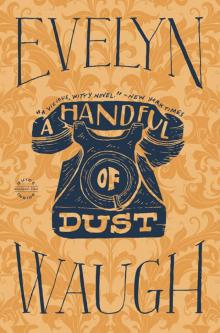 A Handful of Dust
A Handful of Dust Complete Stories of Eveyln
Complete Stories of Eveyln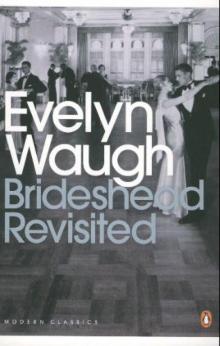 Brideshead Revisited
Brideshead Revisited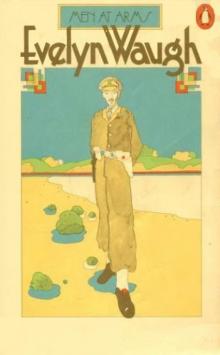 Men at Arms
Men at Arms Black Mischief
Black Mischief When the Going Was Good
When the Going Was Good Officers and Gentlemen
Officers and Gentlemen Helena
Helena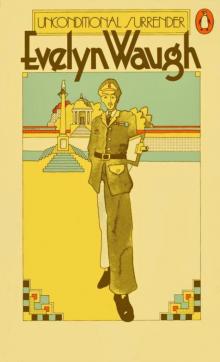 Unconditional Surrender
Unconditional Surrender The Ordeal of Gilbert Pinfold
The Ordeal of Gilbert Pinfold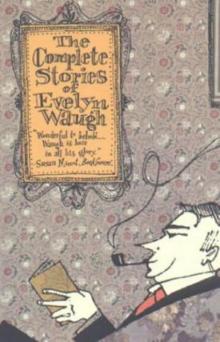 The Complete Stories Of Evelyn Waugh
The Complete Stories Of Evelyn Waugh